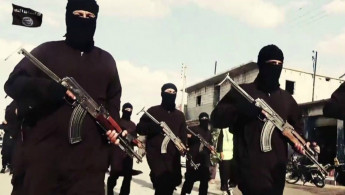IS and Nusra: ruling through fear and intimidation
Extremist groups have forced their laws on the people of northern and eastern Syria, severly restricting freedoms and imposing harsh sentences for disobedience.
The Islamic State group's extreme interpretation of Islamic teaching holds sway in large areas of the country, including its "capital" Raqqa, while the al-Qaeda-linked Nusra Front has imposed its version on Idlib and parts of Aleppo.
Women, the IS has ruled, must remain "hidden and veiled", and must wear full black veils, gloves, plus a loose-fitting garment to conceal their figures. Those found in contravention face punishment.
The IS has made it almost impossible for women to leave their homes. Those who do must be escorted by their husband or a mahram, a male relative they cannot marry.
A school teacher from Manbij in Aleppo province, Ayman Abd al-Hamid, said the IS had also made it hard to educate girls after ordering genders to be segregated in schools. Girls can only be taught by women, and there are not enough women teachers.
Men have been banned from wearing jeans, which are considered western, and anyone caught smoking or in posession of cigarettes can be flogged and jailed for up to a month.
The group regularly kills and maims those it considers to be criminals: Crucifiction and decapitation for blasphemers, stoning for adulterers and the hand-severing for thieves. Those accused of being gay are thrown from tall buildings.
Activist Ahmad Bakr told al-Araby al-Jadeed that the IS had carried out half a dozen executions in Manbij, 90km east of Aleppo, in the last three months.
"They behead offenders with knifes or swords and then they put their bodies on display in the back of trucks and drive around through the streets so as many people as possible can see," he said.
"Last October IS crucified 17-year-old Abdallah al-Boushi in Manbij, for three days. A few months earlier it crucified a 14-year-old for allegedly raping an elderly woman and stealing her jewellery. The IS later admitted there was no evidence the teenager was guilty, and gave the boy's family financial compensation for its mistake."
Bakr added that fear kept Manbij residents from confronting the IS over its harsh punishments.
The IS also regularly kills men, or groups of men, it believes are collaborating with or fighting for its enemies.
Nusra builds its own Islamic state'
Nusra, as lead partner in a new rebel group, Jaish al-Fath, has taken control of the city of Idlib - a key step in its stated aim of establishing an Islamic emirate of its own in Syria. Like IS, Nusra seeks to establish its funadamentalist interpretation of Islamic teaching.
In the past four months since Nusra took control of Mount Zawiya in Aleppo province and few a towns in northern Idlib province, and has imposed laws similar to the IS. In Nusra-controlled areas women cannot move freely without a mahram and women cannot work or go to school and are forced to wear full veils and long flowing robes.
Nusra's courts ruled last October that shops must close during the prayer times. Any that do not adhere are closed down.
The Syrian Network for Human Rights (SNHR) said in March IS and Nusra came second only to the regime of Bashar al-Assad for its crimes against humanity.
The report said the IS had killed 1,231 civilians in Syria, including 174 children and 163 women and arrested 3,914 Syrians, including 478 children and 520 women.
The report also said, IS has been responsible for the disappearances of 1,471 Syrians.
The SNHR reported, Nusra has killed 275 civilians in Syria, including 45 children and 50 women, arrested 1236 Syrians, including 53 children and 30 women, and was responsible for the disappearances of 269 Syrians.
Islamist rule has forced large segments of society to seek refuge in areas out of these groups' control. Raqqa maths teacher Abd al-Qadir al-Jallabi was forced to flee to Gaziantep in Turkey, leaving behind his home and job so his daughters could get an education because the IS prevented them traveling to university in regime-controlled Aleppo.
This is an edited translation from our Arabic edition.



